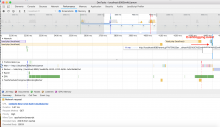In CentralNotice, which runs on almost every pageview, we need to send events with the minimum possible JS code. Client-side validation isn't a priority here... Instead of copypasta-ing some EventLogging methods, it'd be nice to have a minimal EL module that just assembles the URL sends the event.
Reference: https://gerrit.wikimedia.org/r/#/c/408488/

